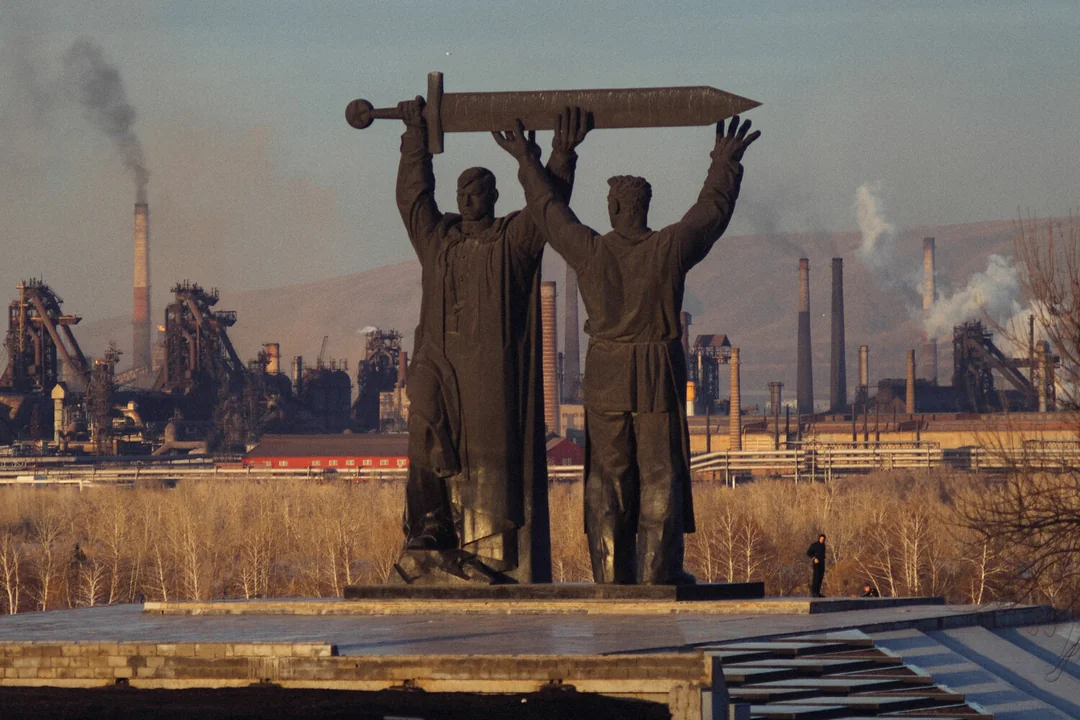James Doone discusses the brutal shift from the medieval world of faith and craft to the cold, choking smog of industrial modernity, drawing on Solzhenitsyn’s scathing critique of Stalin’s USSR, where the iron grip of industrialization crushed agrarian life and the human soul, mirroring the West’s blind, feverish march toward endless growth.
The old world will burn in the fires of industry. Forests will fall. A new order will rise.
— Saruman the White
Such is the line spoke by the fallen Istari wizard Saruman to one of his orcs in Peter Jackson’s magnificent Lord of the Rings trilogy. In The Fellowship of the Ring, we see the medieval world of Middle-earth, of Gondor, the equivalent of high medieval France. Rohan, equivalent of Saxon England, and the Shire, English villages since time immemorial. This medieval world is as our own, in ages past, a place and time where industry was the master craftsman in his workshop, the blacksmith at his anvil, the carpenter at his bench, the stonemason at his rock building a church. It was an era where the trades were one man in one shop, where a boy would become an apprentice of an old master and learn how to build objects of grand magnificence, artistry of sublime beauty, great art, great sculpture, wonderful architectural wonders, such as the dome of Brunelleschi in Florence or the statue of David by Michelangelo and more, even down to finely woven willow for farm fences in the green hills of Oxfordshire. This world of the medieval was truly a shinning time for Faustian man, a time full of the spirit, of yearning for the ethereal, for the divine, not concerned with matters of the earth, of the base, of gold and silver. Though man is always pining for riches, always on the precipice of mammon, he still has a soul that wants to reach paradise. Solar civilisation is far since gone, only the lunar exists now.
Many men, but particularly we Britishers, are most at home in our country cottages, on our farms, by rivers and forests, next to cliffs and beaches, and contemplating the meadows on a summer’s day. Such is the life of John Bull Englander, until the advent of Fordism, the mass-and-scale manufacturing movement that itself sprang out of the Industrial Revolution, founded in Britain in the 1840s. The peaceful shires were bereft of young men, who fled the greens hills for the black doom in the industrial cities, caked in dirt, soot, and black doom. Men forced to work 12- or even 14-hour days for very low wages, a monstrous outrage against humanity. ‘Tis true, the Industrial Revolution brought the wonders of modern civilisation, the aeroplane, car, train, tools, mechanical wonders, engines, and so much more of the things that our world now relies on. But it also brought with it the movement of settled persons, a sense of nomadism, hunting for work, instead of the Scottish highlander tending his sheep on the hills of Argyll, as his ancestors before him have done for millennia. Rather he leaves his land and ventures forth into the crowded and gloomy cities of sin of Glasgow. As Dr Parvini has often stated, most people would rather be peasants than wondering capitalist nomads.
Alexander Solzhenitsyn (1918-2008), the Russian literatus and dissident under the iron claw of Soviet rule who wrote the great works of The Gulag Archipelago and One Day in the Life of Ivan Denisovitch, wrote a famous but less known work, in the mind of the body-politic, called a Letter to the Soviet Leaders which was published in 1975. In this work, the Soviet dissident wrote on how the politburo of the USSR was destroying and had destroyed the hard beauty of the Russian and Ukrainian landscape and nature, polluting rivers and building massive stinking cities of decadence and crime — a grim concrete world, compared to the old Russian bearded elder on the farm with his animals and crops, in the heat of the summer or the bitter cold and frost of the Siberian winter, and yet this old farmer, a man who likes a drink and goes to church for his devotions, is far more to the Russian character than a cosmopolitan Marxist intellectual in Leningrad. Funny isn’t it? Tsar Alexander II freed the serfs and the Bolsheviks sent them back to the Sovkhoz (collective farms) under pain of death. Solzhenitsyn spoke of the need of going back to widespread manual labour, better to have 100 men cutting wheat in a field than one man with a combine-harvester felling the crops, for the idea of continuous economic growth is not only sheer folly but unattainable fantasy, compared to a stable economy.
Solzhenitsyn spent 8 years in the gulag for criticising Stalin.
It was Stalin the ‘red czar’ who sent the Soviet Union crashing into the world of the smog of industry, purely out of military and state power concerns but who could blame him when next door stood the economic and military powerhouses of Germany, France and England, not to mention America? Stalin re-dedicated such cities as Magnitogorsk as centres of heavy industry, modelled off of steel giants like Pittsburgh in Pennsylvania. On the one hand, there is something Faustian in Stalin’s desire to launch the CCCP into the stars. I wonder what a full-length commentary on the Soviet Union Spengler could have created.
Solzhenitsyn, like a seer, saw what this mad craze of industrialism would lead to, like a candle that burns so bright it burns itself to wax, so to will the collective West, ever marching at speed into the grim darkness of the future, with no actual reason as to why? “Economic Growth!” is the mantra, but who for? What has it done for the common working man in the street? Raises some questions doesn’t it.







